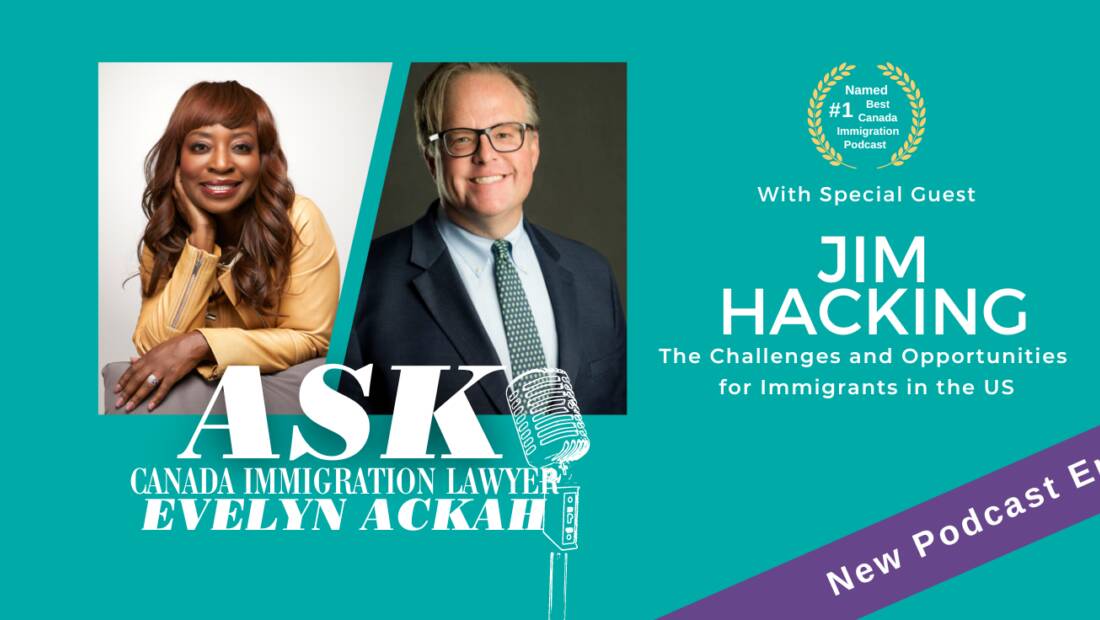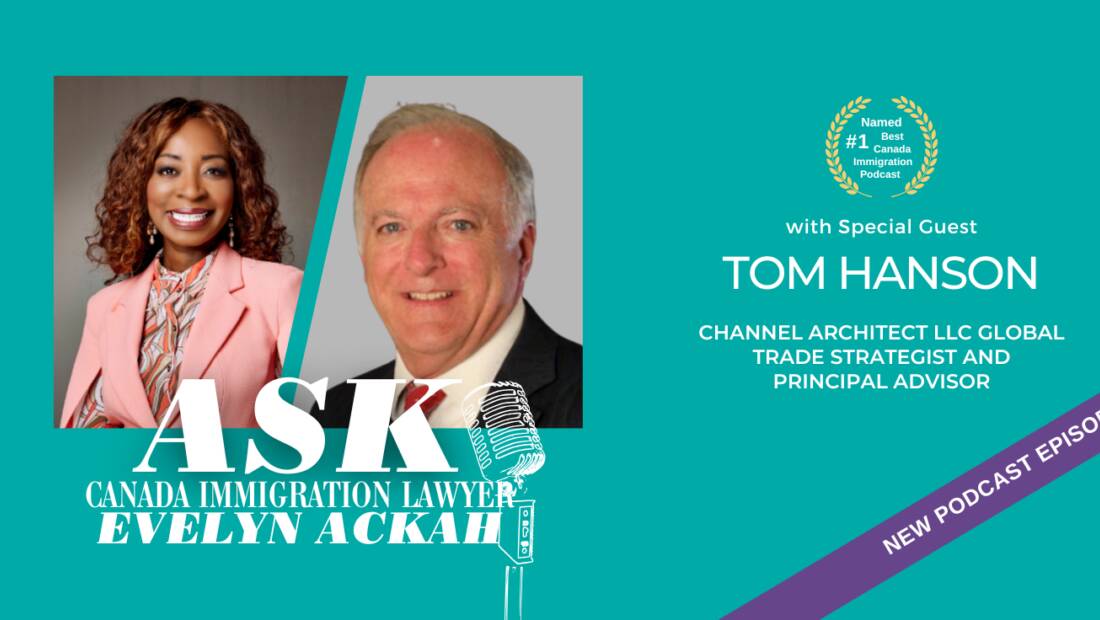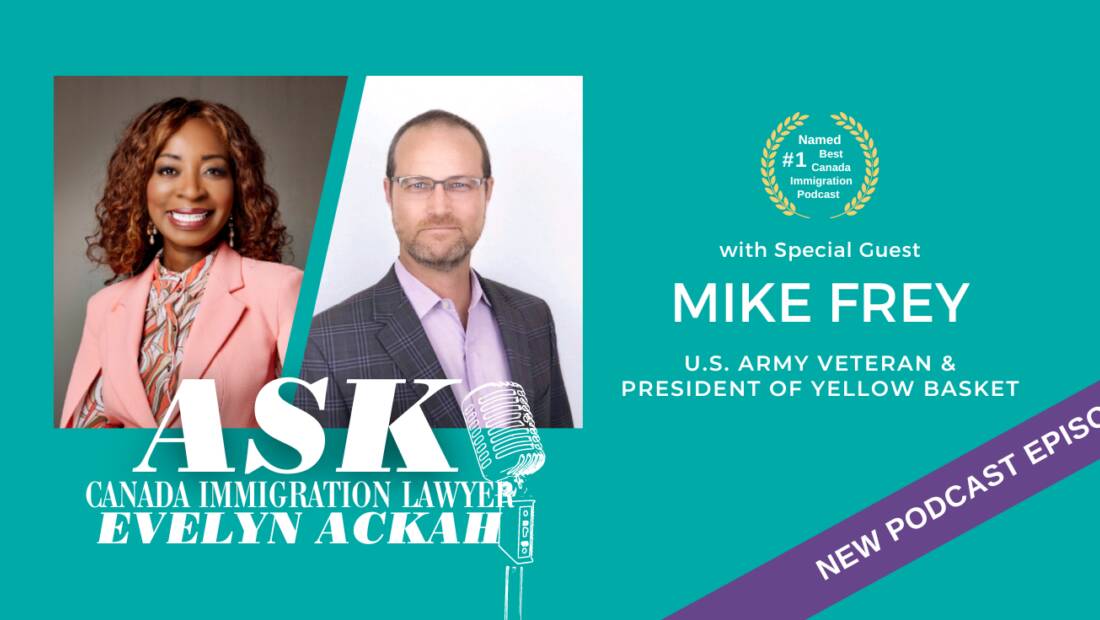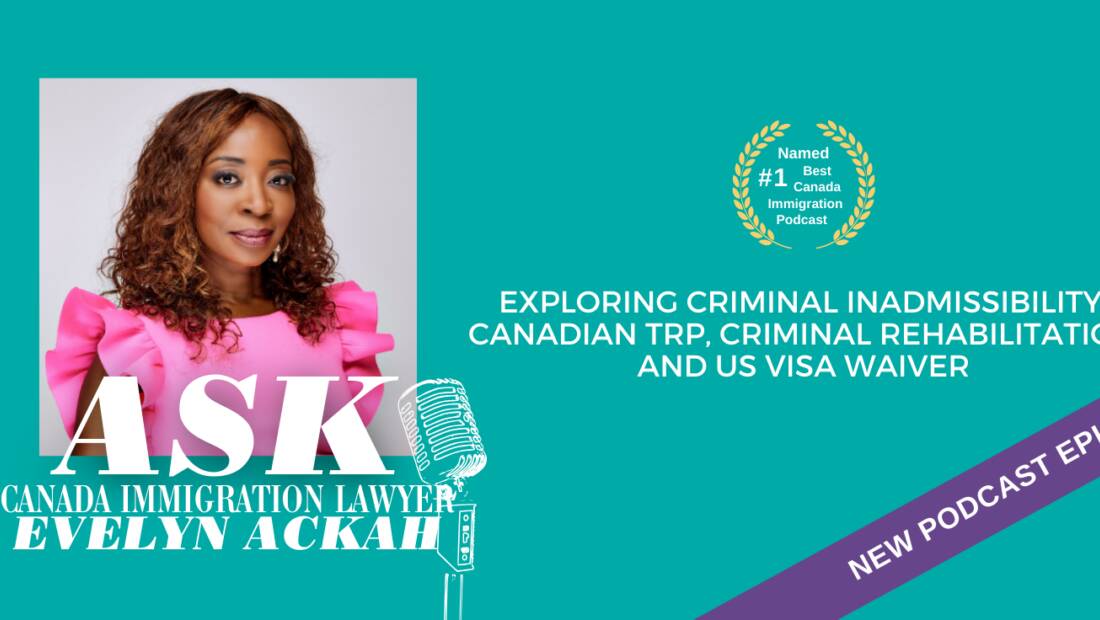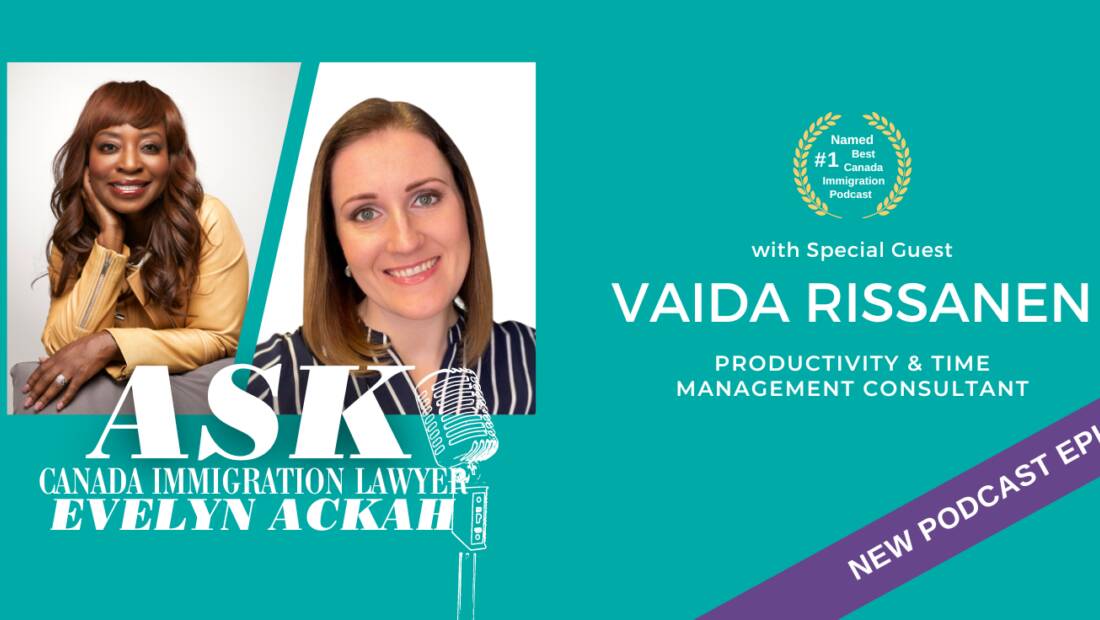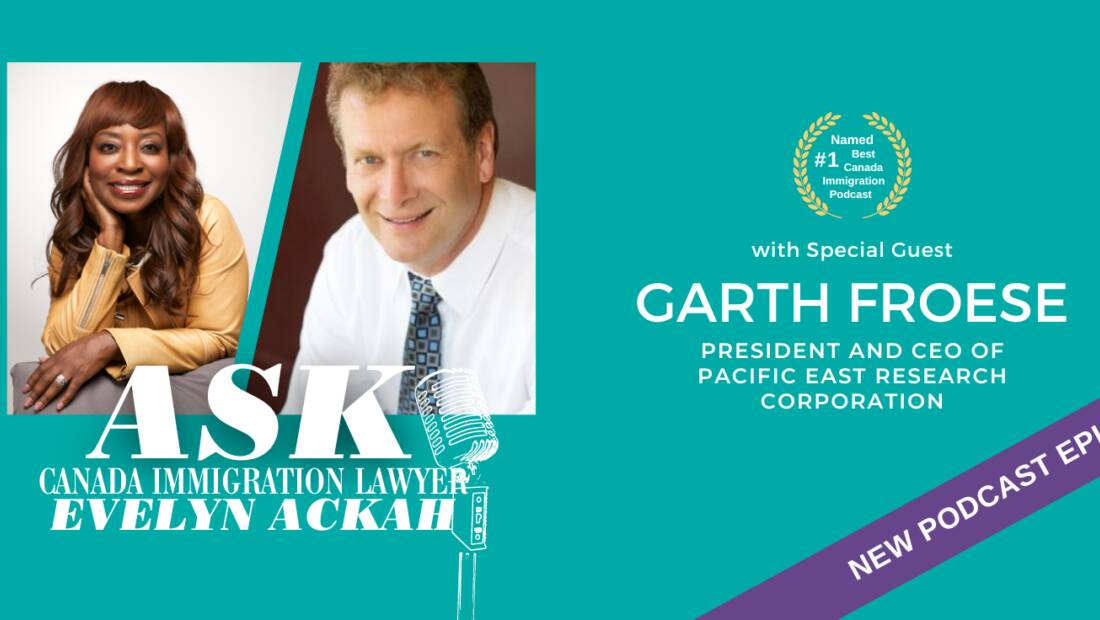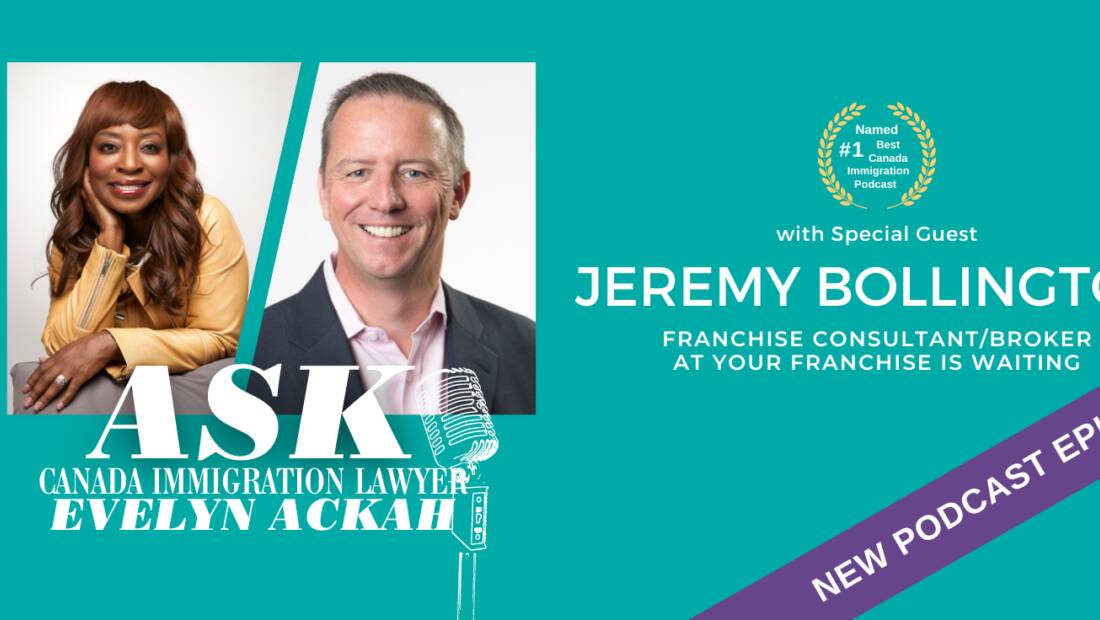Or listen on your favourite podcast app
On the Ask Canada Immigration Lawyer Evelyn Ackah podcast, Calgary immigration lawyer Evelyn Ackah talks to Jim Hacking, the founder and leader of Hacking Immigration Law Firm in the United States and co-founder of Maximum Lawyer. Jim became an immigration lawyer after converting to Islam and marrying a Muslim woman. Hacking Immigration Law Firm's main client base is people who are married to someone from overseas and want to get them a green card or an immigrant visa to come to the United States. The firm also handles citizenship, asylum and employment-based immigration cases.Connect with Jim Hacking on LinkedIn
BOOK YOUR FREE CASE EVALUATION
On the podcast, Evelyn asks Jim:
- What drew Jim to immigration law?
- Jim has built a big firm. What is the most rewarding part of his job?
- What is the most challenging part of his job?
- What is the most common misconception about US immigration law?
- What advice would he give to someone who is considering a career in immigration law?
- What are some of the biggest changes Jim has seen in US immigration law over the years?
- What are some of the most important trends in immigration law that he is watching?
- What are some of the biggest challenges facing immigrants today?
- What are some of the things that Jim is most passionate about in your work?
- What does he see for the future of immigration law?
- What are some of the biggest challenges facing immigrants in the United States today?
- In Canada, we advocate for immigrants to come to Canada - we want immigrants, we’re more welcoming than the United States and we have less barriers. How does Jim respond to that?
- Is running an immigration law firm what he expected? Does he feel he practices immigration law - runs a business - or does marketing?
"I sort of feel like a gunslinger from the old West. I am making the government do what I want them to do." - Jim Hacking
Here are some key points from Evelyn and Jim's conversation:
- Jim Hacking became an immigration lawyer after converting to Islam and marrying a Muslim woman.
- How 9/11 changed his life - and his law practice.
- Hacking Immigration Law Firm's main client base is people who are married to someone from overseas and want to get them a green card or an immigrant visa to come to the United States.
- The firm also handles citizenship, asylum, and employment-based immigration cases.
- The Trump administration was very hostile to legal immigration, which has made it more difficult for people to immigrate to the United States.
- The State Department and USCIS have been gutted under the Trump administration, which has led to delays in processing immigration applications.
- Hacking is optimistic that the Biden administration will be more favourable to legal immigration, but he says that it will take time to undo the damage that was done under the Trump administration.

About Evelyn Ackah
Evelyn Ackah is the Founder and Managing Lawyer at Ackah Business Immigration Law. With offices in Calgary, Toronto and Vancouver, we work with individuals and business owners from all over the world who want to cross borders seamlessly. For more information on immigration to Canada or the United States, Ask Evelyn Ackah at Ackah Business Immigration Law today at (403) 452‑9515 or email Evelyn directly at contact@ackahlaw.com.
The Ask Canada Immigration Lawyer Evelyn Ackah podcast by Calgary Immigration Lawyer Evelyn Ackah was named #1 Best Canada Immigration Podcast in 2022 by Feedspot.
BOOK YOUR FREE CASE EVALUATION
Transcript
Evelyn Ackah:
Good day everyone. It's Evelyn Ackah from the Ask Canada Immigration Podcast. I'm so excited today because I have my friend and colleague, Jim Hacking here with us today, and Jim is the founder and leader of Hacking Immigration Law Firm in the United States. I think they have two or three locations, and he is a wonderful knowledge person based on US immigration. So I'm hoping that we make this useful, and interesting, and fun. Welcome, Jim.
Jim Hacking:
Thanks, Evelyn. How are you doing?
Evelyn Ackah:
I'm great. How are you?
Jim Hacking:
I'm doing very well, thank you.
Evelyn Ackah:
Thank you so much for doing this. I mean, you are one of the leading immigration, US immigration lawyers that I know in the states, and I thought it would be great to have you on our Canadian podcast to really talk about some of the cross border immigration as well as US challenges for people from other countries. So first and foremost, why did you become an immigration lawyer?
Jim Hacking:
So when I was in law school, I started hanging out with a young lady from Egypt, and through that I eventually started visiting, there was a mosque on campus in St. Louis at St. Louis University. I started visiting the mosque and I didn't tell her right away. I wanted to sort of have the freedom to go or not go and tell her or not tell her. So eventually I converted to Islam and I became a Muslim, and that was in 1998, and we got married about a year later. And then 2001, 9/11 happened. And for the first 10 years of my career, or 8 years of my career, I was a barge attorney. I was doing maritime work up and down the Mississippi River and the Muslims at the mosque would always ask me to help them with their immigration case, and I would always turn them down.
And when I would try to refer them to other people, those people, those other immigration attorneys would always tell me how busy they were. And I'd go, "That's interesting." And the firm that I was at, I had two great mentors. One was 55 years old, one was 45 years old, and I was 35 years old. And we had four clients, so two insurance companies, a company that pushed barges up and down the river, and then a fleeting company. And I thought, there's four clients here and there's three of us. If something ever happened, I didn't want to be left holding the bag. My partners were very trustworthy. I'd become a partner in the firm. And then one day I had what Michael Gerber in the EMyth calls the entrepreneurial seizure, and I said, "I need to have my own law firm and I want to have my own clients." So I went to my wife, Amani, and I said, "I want to have my own law firm. I want to have my own clients. It's something that I've always dreamt of." She said, "That's interesting. We've been married for 12 years and you've never mentioned it."
So nonetheless, after about a year of begging, cajoling, prodding, imploring, and pleading, doing everything I can to try to get her to agree, she said, "Well, do you have a binder?" I'm like, "No, I don't have a binder." "Well, you got to do a binder of all your procedures and you got to figure out where your clients are going to come from."
And so in late 2007, I told my partners that I was leaving and I went out on my own. And my thought was that I would do all kinds of law for immigrants. And so at first, Adella will tell you, Adella is my longtime assistant who now helps run the firm. We've been together for 15 years, and she was getting her bachelor's and then master's in HR, and she would write all of her papers about all the things I was doing wrong when it came to HR and running a business.
And so very quickly it became evident that the real need wasn't any type of law for immigrants, but rather practicing immigration law and helping people get immigration benefits. And then I felt more comfortable in a courtroom than I did on sort of obscure... I hadn't taken immigration law, I hadn't taken administrative law, but when I went around to the mosque, everybody told me that they'd been waiting for their citizenship for a really long time. And so I found out about this program started by the Bush Administration that was slowing down immigration to the US for people from predominantly Muslim countries. And I filed a big lawsuit. I went around to the mosque and I charged everybody $250 to be in this lawsuit. And so I had 36 plaintiffs, and I tried to make it a class action, and the judge said no. But within six months, 34 of the 36 had become US citizens. After some waiting, 3, 4, 5... One lady was waiting 9 years. So that got me a lot of good in Arabic, we would say [foreign language 00:04:56], a lot of good feeling, a lot of good happiness. And so people started referring me stuff, and then we were just off to the races. So then in 2012, we switched to only immigration.
Evelyn Ackah:
That's incredible. What a great story. I love that. I love that. And I think that obviously you're married to an immigrant, I'm an immigrant. It's like you really see the experience, even if it's been decades and decades in the country, experience that immigrants have, and obviously through the mosque as well as your larger community, how challenging it can be. So tell me where your main client base is. Who are the people? What kind of immigration do you do for most of your clientele?
Jim Hacking:
So we're mostly family-based immigration. So our bread and butter is somebody married someone from overseas and wants to get them a green card or get them an immigrant visa to come to the United States. That's about 30% of our practice, 50% of our practice. So since that first lawsuit that I filed back in 2008 or 2009, I sued them 1,600 times. So that's my favorite thing to do. And-
Evelyn Ackah:
Sue the US government,
Jim Hacking:
... So we actually have it all built out and all tricked out, and the team does a really good job. Now, I'm not really that involved in the lawsuits unless something pops up, but that's, excuse me, a big part of our process. Then citizenship asylum, and then we do probably 15 to 20 H-1Bs and probably a similar number of employment based green cards a year.
Evelyn Ackah:
Wow, okay. So do you do, Jim, the family stuff is great, obviously that's so satisfying more than anything else, but do you do as well H-1B type of stuff?
Jim Hacking:
Yeah, we do about 15,20 H-1Bs a year. We probably do about five TNs a year. We do a fair number of employment based green cards. A lot of people right now are calling me about national interest waiver or exceptional ability. And I tell them I'm the place where those people go to cry because I'm very pessimistic on those.
Evelyn Ackah:
Not everybody's extraordinary.
Jim Hacking:
If everybody's extraordinary. Nobody's extraordinary. That's right.
Evelyn Ackah:
Okay, I got it. So tell me right now, in terms of the politics of the United States, have you seen a change? Have you seen anything that is impacting your practice positively or negatively? Because when the Trump era came, that was a whole new world for everybody dealing with cross border and US immigration. What are you seeing now?
Jim Hacking:
So it's sort of ironic, Evelyn, back when Obama was president, we called him of all people, the Deporter in Chief because he had deported and they were catching a lot of people at the border, and all those were counting as deportations. But if you and I sat down and said, "Let's go out to Hollywood and hire some screenwriters and some directors to create the biggest immigration villain that ever lived." We couldn't have designed someone as bad as Donald Trump. And the thing about Trump is he wasn't the brightest bulb in the bunch, but he brought in the very, very far right guys from this organization called Fair, these people, people that just hated immigrants. And they literally sat around all day thinking about not so much about people who entered without inspection, but more about how to slow down legal immigration to the United States by people from brown countries.
Evelyn Ackah:
My God.
Jim Hacking:
And so guys like Steven Miller and Steve Bannon designed the Muslim ban on the back of a napkin while they were at happy hour the first Friday before Trump took office. These people just, I mean, literally we would see a month or two months worth of immigration changes happen in every day of the week. So everything was accelerated. So they spent four years just pounding on legal immigration. They gutted the State Department, they gutted USCIS, they took a ton of USCIS's money and spent it on Trump's stupid wall.
Evelyn Ackah:
The wall.
Jim Hacking:
And border protection and left an agency. They've left two agencies that have not summoned the political will or the intestinal fortitude to fix things. They're just happy enough to say, "Woe is us. Give us some more money. Covid, Covid, Covid, things suck. Things are slow."
USCIS, so Evelyn, the main petition that people use to sponsor a family member called an I-130 petition. When I first started practicing, it took them three or four months to process an I-130 petition. They just updated about a month ago at the National Benefits Center. It's taking 50 months.
Evelyn Ackah:
Oh, my God.
Jim Hacking:
Four years and two months to just process whether or not you and I are eligible to marry each other. That's the only question-
Evelyn Ackah:
Oh, my God.
Jim Hacking:
... Whether it's a real marriage. So they have not done anything to move things along. It's really bad.
Evelyn Ackah:
That's painful.
Jim Hacking:
So it's not so much that there are evil people in the Department of Homeland Security and USCIS, it's that they're people who don't give a crap.
Evelyn Ackah:
And probably not as many resources. They don't have the budget. If they slashed and burned, they don't have enough people perhaps. That's brutal.
Jim Hacking:
The embassies have been really gutted, and there aren't people there who can process cases. And you talk about, especially some of the African countries, you're talking people even after they go through UCSIS and get the petition approved, which takes now a year or two, then you're talking another year or two waiting for the embassy to have an interview slot and nobody's talking about it. Nobody's doing anything. It's really terrible.
Evelyn Ackah:
So in a case that as the lawyer, what could you do? But that, that's not a lawsuit situation, right?
Jim Hacking:
Yeah.
Evelyn Ackah:
It is?
Jim Hacking:
Well, yeah. Yeah. So that's exactly what we sue over. So if people have been waiting 18 months or 24 months just for USCIS to approve the I-130, we file a lawsuit. If they've had their interview at the embassy, the thing, I don't know if you see this up in Canada, but so much of it isn't so much yes or no. It's like, "We don't know what we want to do." So they just put it up on the shelf and that's when we sue them is when they're just sitting on a case. Because the law in America says, "You can approve a case, you can deny a case. You can't ask a judge to review the denial of the case." But if they don't take any action, then you can sue them over that.
Evelyn Ackah:
So that's the mandamus that you do?
Jim Hacking:
That's mandamus. Yes.
Evelyn Ackah:
Okay. That's fabulous. Wow. So right now I'm thinking about we've got the Democratic Party in. Have you seen any changes or improvements at all?
Jim Hacking:
No.
Evelyn Ackah:
That's the thing. That's what I'm noticing. Nothing.
Jim Hacking:
There's not the active evilness in making things harder, but it's just like a lethargy. I mean, to me, in my mind, our country's being run by an 80-year-old man, and it seems like a bunch of 80 year olds are running USCIS, not to be ageist or anything, but just there's no real sense of urgency.
Evelyn Ackah:
Oh my God. What countries do you think most of your people who find, you come from originally? Where is your regional focus?
Jim Hacking:
So North Africa for sure, and then all the way over to Pakistan. So we have predominantly Muslim clients from predominantly Muslim countries, but right now with the YouTube channel that I have, and the Facebook group that I have, our main office is in Missouri, and only 15% of our clients are from Missouri. So with lawsuits, we handle people all around the country, all around the world. And then we do have a fair following in Ghana on the live show. So the people are very kind and they keep inviting me to come visit Ghana. So-
Evelyn Ackah:
You need to go.
Jim Hacking:
I want to go. And my son Yusef really wants to go. My first client ever was from Senegal, so I really want to go to West Africa.
Evelyn Ackah:
Oh, it's beautiful in that part of Africa. Yeah, that is so great. So I've been watching you. You've got your LinkedIn Lives, you've got your radio show, you've got all these things you're doing in terms of diversity in your office and language, is it mostly Spanish speakers, or do you have other languages to help with your clientele sometimes, or they all have to speak English?
Jim Hacking:
Well, most of our clients do speak English or they have a family member, usually eldest child of the family who can speak English. But that hasn't really been an issue for us for a while. I mean, right now most of our phones are answered in Argentina. So we have a ton of Spanish speakers. My wife speaks Arabic, St. Louis, Evelyn, I don't know if you know this. St. Louis is a refugee resettlement city. So we actually have the world's largest population of Bosnians outside of Bosnia here in St. Louis.
Evelyn Ackah:
Wow.
Jim Hacking:
So there's 70,000 Bosnians in St. Louis. So Adella, my assistant and Amara, my personal assistant, are both from Bosnia originally. So we have that covered and then-
Evelyn Ackah:
Perfect.
Jim Hacking:
... Yeah, we got all kinds of different languages. We have someone from Thailand.
Evelyn Ackah:
That's good.
Jim Hacking:
Yeah, all over.
Evelyn Ackah:
It really helps. I mean, obviously the other day somebody called and she engaged us and she speaks English. She's been in Canada for, I don't know, 9, 10 years. But she wants to talk to me in Twi, which is one of the main dialects in Ghana. And I'm like, okay, I understand everything you're saying, but I'm going to respond in English if that's okay, because my Twi is not strong. And that was like she was happy. So she engaged us for a full big file. I want to ask you about the US in terms of their view of immigrants. Like in Canada, we really, really recognize the importance of immigration because we are an aging population. People are not having enough babies. Employers can't find workers. The whole post Covid world where people just don't want to work. So immigration for us is critical and we're trying to make changes on a regular basis to attract people. Do you think that the US has that same philosophy and why not?
Jim Hacking:
All those same problems that you mentioned, an aging population, a low number of potential workers, not to mention the diversity that immigrants bring to a community. All those things are true here in America, but the problem is that the megaphone of the hard right crew, the jingoistic, xenophobic, white nationalist types, even if they're white nationalist lights, who just control the narrative on immigration. I mean, our country is politically broken because of gerrymandering, because the districts are, I think 80% of our districts are entirely red or entirely blue. Well, when your districts are entirely red or entirely blue, then the people running those districts don't need to care about the people in their district. There's no reason to compromise. So there's no compromise. So there's nothing being done for immigrants to make their lives easier, or more pleasant, or we have all kinds of people that I know, startup founders who leave to go to Canada because Canada's so much more receptive to them, and it's really, really dumb.
Evelyn Ackah:
I agree. I mean, right now, we just launched today, think it's July 16th, a new H-1B program to attract H-1B visa holders to come to Canada. They don't even need to find an employer. They can get a work permit because we need them, and then they'll start jobs or start businesses. And it's crazy that these talented people are having to leave the US because of these long, long green card processing from the countries that they're from. So there's Pakistan, or China, or India. It's crazy that you would wait 8 to 10 years to get your green card. So in Canada, you can become a permanent resident, 3 years.
Jim Hacking:
And there's a point system where it's just based on your credentials. And that in and of itself is enough. And I mean, over here, we can't argue. We can't figure out whether or not we want spouses of workers to get a work card. I mean-
Evelyn Ackah:
Oh, my God.
Jim Hacking:
It's terrible.
Evelyn Ackah:
... It's really hard. So working in this environment, regardless of the party that's in power, how do you keep positive and optimistic? How do you not get overwhelmed with some of the real sadness, or tragedy, or just frustration and running a business as you and I both know, is not an easy thing. How do you keep optimistic about the importance of the work you do?
Jim Hacking:
Well, luckily, one of the things about me is I wake up every morning very optimistic. So I get a little more pessimistic as the day goes on.
Evelyn Ackah:
As the day goes.
Jim Hacking:
But I try to tap into that and keep it alive as long as I can each day. So I work out first thing in the morning, and that really helps sort of shoot me through the day. And so my wife and I are both pretty optimistic. I mean, immigration is hard, especially when you're dealing with asylum work or refugee work that it's really sad. And Amani's had some really hard asylum cases, and some of the employees have talked to us about, "Hey, look, can we get some resources for some of these sad stories that we hear?" And I think that's something that lawyers and law firm owners really need to think about. Right now, we're looking at the fact that we're probably working our team a bit too hard and we're trying to figure out ways to make staying in the biz a little more attractive.
Evelyn Ackah:
I hear you. It's hard. I mean, just the whole operation that you run and that I'm running and learning. Constantly, learning every day, and keeping up with all the changes in the law. So what do you see as the future of immigration law in the United States? I mean, do you see it as continuing to expand? Because I know you have big goals, I have big goals when you run a business, but do you see that immigration law itself is going to be a viable career for somebody 20 years from now? Are they still going to need us, or is it all going to be AI and we'll be long gone?
Jim Hacking:
Both.
Evelyn Ackah:
Oh.
Jim Hacking:
AI is going to knock out a lot of bad immigration lawyers.
Evelyn Ackah:
As it should.
Jim Hacking:
There's going to be some, yeah, as it should. There's going to be some people who sort of rise to the top. And also, I believe there's always going to be a need for what Dean Jackson calls, "the last five yards," the last part of the transaction, the interview, or the prep or the, I've been doing this for 15 years and I talk to immigrants every single day, and I'm still surprised at some of the mistakes and ways people, I mean, things happen to immigrants that I never could have dreamt up, and they find themselves in these situations that I never could have conceived. And so I think they'll always be a need. But I mean, Evelyn Al Gore said that the federal government was going to be paperless. He said that back in 1992 or something. And here we are.
Evelyn Ackah:
Here we are.
Jim Hacking:
I don't know how it is in Canada. There's still tons and tons of paper files.
Evelyn Ackah:
Same here. And they're doing more and more portal applications where you can upload things, but there's still paper options and paper applications. So no, this has been really helpful. So let me just ask you to start to wrap up. What are your ideal, oh, sorry. Before we do that, what is the common misconception that you hear from immigrants? Because I get a lot of these, "Oh, I heard from my friend, this is what happens, and this is what my brother told me." What is one of the most common misconceptions? I find it just hilarious.
Jim Hacking:
Well, then maybe you've heard of the magical attorney in California who can get any immigration benefit in three weeks. Is that who you're referring to?
Evelyn Ackah:
I have one of those in Canada too.
Jim Hacking:
Maybe it's Calgary instead of California, but yeah. Yeah, we really, I mean, immigrants are without a doubt, a vulnerable population for the most part. So they're easy to take advantage of. And there's lots of people, to your point earlier, that do take advantage of them. There are, I don't know if you have these things in Canada, but here we call them Notarios I call them fake lawyers. They sort of have a website. They say, "We fill out forms." But they don't know what the forms mean. They don't know what questions might render somebody inadmissible to the United States. So I think the biggest misconception is that they can do it themselves, or if they do it themselves, and some people say, "I'm going to try it myself and then I'll hire a lawyer if I need to. I'll hire a lawyer, clean it up later if need be." But of course, they can really put themselves in a situation that's going to make them inadmissible they can't be fixed by a lawyer.
Evelyn Ackah:
Yeah, I totally agree with that. I think that's the biggest one is you don't need a lawyer to do this. And I would say back in the day, maybe even when my dad first immigrated to Canada, like 1972 or '73, he didn't need anybody. It was like a few forms and it was done. But it's become so complicated, and you're right. When people think I can do it, then they mess up, but then they come, it's harder for us to fix the mistakes. I always say that, "What is at stake for you if you don't get this approval? Don't get it done properly?" So yeah, I think that's one of the most important things. I just want to wrap up and ask you about who you think are your ideal referrals? Because we have lots of people that listen to our podcast. Luckily, not nearly as big as yours, but I want to know so that if people listen to this, they get an idea of who you are interested in working with at Hacking Immigration Law.
Jim Hacking:
Mostly it's people who have their immigration cases stuck. So anyone who has an application that's been pending with USCIS for a really long time, I really feel Evelyn like sometimes I'll file a lawsuit and because of the lawsuit, the client will get the interview. Then I fly into town, I do the interview, and I sort of feel like a gunslinger from the old West. I am making the government do what I want them to do. I mean, a lot of these people come from countries where if you even tried to sue the head of the government, they throw you in jail. So I love this idea of coming into town, making them do what I want them to do and then flying back out like a cowboy.
Evelyn Ackah:
I love it.
Jim Hacking:
So anyone with those kinds of cases. And then just traditional marriage based cases, that's really our bread and butter is those kinds of cases. We like to work with, optimistic people. We like to work with people who understand our value, who aren't just going to nickel and dime us on everything or complain about everything. I had to tell a client on Friday, I called him up and I said, "I'm going to fire you as a client." And he said, "Why?" I said, "Because you're mean to my staff." I said that we were doing everything we're supposed to and you're being abusive with these emails. So he begged me not to fire him, so I didn't. But he's on a very short leash.
Evelyn Ackah:
Yeah, I do the same. We have to take care of our team. That just happened to me last week too on Friday it's interesting. Fridays are usually crazy day I say, here at the office, I find that some things are a little nutty. Anyway, I want to thank you so much for joining us on the Ask Canada Immigration Podcast. Jim, I love the podcast, the Maximum Lawyer Podcast that you and Tyson have been running forever. And then the Guild Podcast and the whole community you've built has just been so fabulous and supportive of us lawyers trying to run a business and also grow ourselves personally and professionally. So I want to thank you very, very much for all of that support and for joining us today.
Jim Hacking:
Awesome. Thanks so much. I enjoyed being with you.
Evelyn Ackah:
Thank you. Okay. You take good care.
Jim Hacking:
Thanks, Evelyn.

